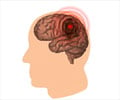Researchers have discovered a reason why smoking greatly increases the risk of heart disease and stroke.
Researchers have discovered a reason why smoking greatly increases the risk of heart disease and stroke. Nicotine promotes insulin resistance, also called prediabetes, which is a risk factor for cardiovascular disease, according to the new study, which was presented at The Endocrine Society's 91st Annual Meeting in Washington, D.C.
Additionally, the study authors were able to partially reverse this harmful effect of nicotine in mice by treating them with the nicotine antagonist mecamylamine, a drug that blunts the action of nicotine.The study, which the National Institutes of Health funded, was conducted by researchers at Charles Drew University of Medicine and Science in Los Angeles and Western University of Health Sciences in Pomona, Calif.
Their results may explain why cigarette smokers have a high cardiovascular death rate, even though "smoking causes weight loss, which should protect against heart disease," said the study's lead author, Theodore Friedman, MD, PhD, chief of the endocrinology division at Charles Drew University.
Prediabetes and diabetes are known risk factors for cardiovascular disease. Past studies show that cigarette smokers tend to be insulin resistant, meaning that their hormone insulin does not work properly. To compensate, their blood glucose (sugar) levels become higher than normal but not yet high enough for diabetes. Smokers also have higher rates of diabetes, but it is not clear whether smoking is the cause, because they could have other risk factors, Friedman explained.
Some studies demonstrate that nicotine and cigarette smoking induce high levels of the stress hormone cortisol. "As cortisol excess is known to induce insulin resistance, it has been suggested that glucocorticoids, such as cortisol, are the missing [causative] link between cigarette smoking and insulin resistance," Friedman said.
The new study results suggest this theory is correct, he said. The researchers studied the effects, on 24 adult mice, of twice-daily injections of nicotine for 2 weeks. The mice ate less food than control mice that received injections without nicotine, and they also lost weight and had less fat. Despite this, the mice receiving nicotine developed prediabetes (insulin resistance), which subsequent mecamylamine treatment improved somewhat. These mice also had high cortisol levels in their blood and tissues, and mecamylamine blocked this effect.
Advertisement
Currently available nicotine antagonists are not specific enough to completely block nicotine's effects or they have bothersome side effects, so better drugs are needed for this purpose, he said.
Advertisement
SRM














